THE OGONI PEOPLE: The Oil Rich Nigerian Tribe That Didn’t Lose A Soul To Slavery(history+pics)
CREDITS TO: Trip down memorylane Blog
 |
| . |
INTRODUCTION
The Ogoni Kingdom (also known as the Ogonis) are one of the many indigenous peoples in the region of south south Nigeria. They number about 1.5 million people and live in a 404-square-mile (1,050 km2) homeland which they also refer to as Ogoni, or Ogoniland. They share common oil-related environmental problems with the Ijaw people of Niger Delta.
The Ogoni rose to international attention after a massive public protest campaign against Shell Oil, led by the Movement for the Survival of the Ogoni People
The Ogoni are a distinct people who have lived in the Niger Delta for more than 500 years. The Ogoni are an agricultural and fishing society, living in close-knit rural communities in one of the most densely populated areas of Africa.
The Ogoni people attracted international attention and world wide sympathy when in 1990, Ken Saro-Wiwa, an internationally acclaimed poet, author, and activist from the Niger Delta, began mobilizing his people, the indigenous Ogonis, for nonviolent protest against the Shell Oil Corporation. For more than 20 years oil spills and gas flares from the multinational’s oil explorations had destroyed the environment and the health of the indigenous Ogonis, causing thousands of lost lives. Five years after the start of his campaign, Saro-Wiwa and eight other indigenous Ogoni activists includingBaribor Bera, Saturday Dobee, Nordu Eawo, Daniel Gboko, Barinem Kiobel, John Kpuinen, Paul Levura and Felix Nuate were brutally hanged for their peaceful protest on the orders of General Sani Abacha, then military dictator of Nigeria.
HISTORY
The true origin of the Ogoni people are not very well-known,research has it that they migrated into the area from across the Imo River while other research says that the Ogoni people came in boats from old Ghana Empire and settled in the Atlantic coast eventually making their way over to the eastern Niger Delta. Believers in this theory point to the name by which most of the Ogoni peoples call themselves (Khana) as a pointer to the Ghana origins of the Ogoni people.
Archaeological and linguistic evidence suggests the Ogoni have inhabited the Niger Delta for up to 500 years. Linguistic calculations done by Kay Williams place the Ogoni in the Niger Delta since before 15 BC, making them one of the oldest settlers in the eastern Niger Delta region. Radiocarbon dating taken from sites around Ogoniland and the neighboring communities oral traditions also support this claim. The first village that was formed by the Ogoni people is called Nama in Keh Khana Kingdom.
THE ERA OF SLAVE TRADE
They established an organized social system which worked under a monarchy and under which men and women of courage and ability enjoyed a special status. During the slave trade, Ogoniland lay on the slave route from the hinterland to the coastal slave markets. However, no Ogoni man or woman was taken as a slave. Marriage with a neighbour, except the Ibibio, was forbidden by Ogoni customs and tradition. This way, the Ogoni people were able to live in relative isolation during the era of the slave trade. When other forms of trade were introduced into the region in the second half of the 19th century, weapons were purchased and wars became the order of the day. After the Berlin Treaty of 1885, Nigeria came under British colonial rule, but it was not until 1901 that British forces arrived in Ogoniland. The cultural diffences led to resistance on the side of the Ogoni people, but as they were not strong enough to resist the British patrols the Ogoni people were finally subjugated in 1914. The British saw Nigeria in terms of three major ethnic groups: the Hausa-Fulani, the Yoruba and the Igbo, thereby ignoring more then 250 smaller peoples, including the Ogoni. The Ogoni were regarded with contempt by all other groups in the Delta region and were often positioned at the bottom of the social ladder.
DEVELOPMENT
The Ogoni were integrated into a succession of economic systems at a pace that was extremely rapid and exacted a great toll from them. At the turn of the twentieth century, “the world to them did not extend beyond the next three or four villages,” but that soon changed. Ken Saro-Wiwa, the late president of MOSOP, described the transition this way: “if you then think that within the space of seventy years they were struck by the combined forces of modernity, colonialism, the money economy, indigenous colonialism and then the Nigerian Civil War, and that they had to adjust to these forces without adequate preparation or direction, you will appreciate the bafflement of the Ogoni people and the subsequent confusion engendered in the society.
Ogoniland had her first graduate and modern political leader in the person of Mr. Timothy Naakue Paul Birabi. A graduate of Mathematics in 1953, late Birabi was a teacher by profession, he organized the Ogoni people to build their own schools and health centers, which included the Birabi Memorial Grammar School (BMGS), the premier high school in Ogoniland. Birabi was the first man to give the Ogoni people the sense of modern organization of the Ogoni affairs. He died in a mysterious circumstance that was linked to his
political activities and co-ordination of the Ogoni people. Paul Birabi taught the Ogoni people to build their own schools and social amenities and it has thus become a tradition that the Ogoni people are still building their own schools. While the government takes over the management of these schools from them and imposes high school fees that the Ogoni people cannot pay.
The first missionary that came to Ogoni land was Rev. Paul Kingston of the Methodist church in 1926. He studied the Khana language and then went back abroad to develop the alphabets. This enabled him to translate the bible into Khana in 1929. Today the Lutheran Church is about to complete work on the Gokana bible translation as well as the Eleme bible translation. This early foundation played a very key in giving the Ogoni people a realization and need to acquire modern education, and they embraced it according to their resources and strength, depending on community and missionary scholarships to train the first sets of
graduates in the land. This history of organizing a common destiny through the giving of scholarship to deserving persons, community businesses, community projects is what Ken Saro Wiwa argued extensively. Stressing the need to recognized and encouraged as ethnical governance and organization as part of the Nigerian state using a fair proportion of the natural resources in the land for the development of the people as way of protecting the Ogoni as minority group as well other groups. It is this struggle led by Ken Saro Wiwa is what brought the Ogoni people to the world political map.
SIMILARITIES BETWEEN OGONI PEOPLE AND THE EWE PEOPLE OF GHANA
The Ogoni people obviously had elements of other tribes in their culture as a result of interaction and that does not change the fact that they migrated from Ghana.
Comparing the customs and ways of life in the Volta Region of Ghana to those of the Ogoni people, it has been discovered that:
The method of farming in the Volta Region of Ghana and that of the Ogoni people are almost the same. The Volta Region of Ghana farms cassava and yams as their chief crops and so does the Ogoni people. And these two crops are planted in the same ways in the Volta Region of Ghana and in Ogoniland.
There are several villages and communities, whose names are the same as common names, villages and communities in the Ogoniland e.g. (Eleme, Kpone and Bakpo)
The alphabets and pronunciation of some Volta peoples and those of the Ogoni people are the same.
The method and style of building native huts with mud and thatches are the same.
Ogoni History After Nigeria`s Independence
As a result of their small size, a history of poor relations with the Nigerian government and group concentration in a volatile area, the Ogoni are an organized and cohesive group.
The group has received much attention in recent years because of their struggle for compensation from Shell Oil and the Nigerian government for damage to their lands caused by oil spillage. Nigeria’s oil industry accounts for 90 percent of its export earning, and even the smallest disruption has been threatening to the government. The Ogonis are located in the Niger Delta region in the city of Port Harcourt. Port Harcourt is the capital city of Rivers State, Nigeria. The Ogoni have not moved very far from their traditional territory (GROUPCON = 3). The Ogoni had autonomy over their territory until 1914, when Britain consolidated the area into the Nigerian Protectorate (AUTLOST = 1.25). Since that point the other larger ethnic groups the Ibo, Hausa/Fulani and Yoruba have dominated the economic and political scene in Nigeria.
The British practiced indirect rule in Nigeria as they had in much of the rest of their colonial states. However, for various reasons, the British favored the Ibo, and this favoritism led to further conflict with other groups when the Ibo were placed in authority positions in the north and southwest. As the press for independence intensified, the Ibo came to support the National Council for Nigeria and the Cameroons (NCNC), led by Dr. Nnamdi Azikiwe. The Yoruba mainly supported the Action Group (AG), and the Hausa/Fulani supported the Northern People’s Congress (NPC). The NCNC and NPC formed a coalition that led the country to independence in 1960. The AG was largely marginalized from the federal government during the early years of independence, which led to a renewal of Yoruba factionalism. In January 1966, an Ibo-lead coup took control of the government.
In 1967, disputes between the eastern Ibo region and the government led to a declaration of secession by the eastern region. The independent state of Biafra was declared on 30 May 1967. Led by Lt-Col Ojukwu, the Biafra war lasted until January 1970, when Biafran troops surrendered. It is estimated that 100,000 casualties resulted from the war itself, and that an additional 500,000-2,000,000 civilians died, mainly from starvation, as a result of a blockade by the federal government. Ogoniland was occupied by Biafran troops during the conflict.
Following the Biafra war, civilian rule was restored for a brief time in the late 1970s and early 1980s. Power became more and more entrenched in the hands of northerners during the 1980s and 1990s. On 31 December 1983, Muhammad Buhari led a military coup and banned all political activity in the country. In August 1985, Ibrahim Babangida took power in a peaceful coup.
By 1987, Babangida announced that he was preparing to turn the government back to civilian rule. In June 1993, presidential elections were held in the country. Two parties were allowed to contest the elections: the National Republican Convention (NRC) and the Social Democratic Party (SDP). The former was led by a northerner Alhaji Bashir Othman Tofa, an economist and businessman. The latter drew large support from the Yoruba community and was led by a prominent Yoruba businessman, Moshood Abiola. When it became apparent that Moshood Abiola, a prominent Yoruba businessman from the south, was going to be the victor, Babangida declared the elections null and void. Abiola declared himself president, but later fled the country in the wake of death threats against him. Abiola eventually returned to the country and was subsequently arrested on charges of sedition. Nigeria plunged into its worst crisis since the Biafra war from 1967-70. Babangida resigned in August 1993. The government was taken over by an interim council, but the real power was in the hands of General Sani Abacha, then secretary of defense. He led a very oppressive regime under which thousands were jailed and countless numbers killed, particularly in the Niger Delta, where the Ogoni are concentrated.
 |
| An Ogoni man and his family |
OIL, MILITARY AND MILITANCY
In the early 1990s, militant activism in the Niger Delta region had emerged as the main strategy in the struggle of the people for a greater share of oil-generated wealth. The Niger Delta region consists of a number of administrative states, including Rivers, Delta and Bayelsa, and is characterized by numerous waterways and mangrove swamps. Until 1993, the Ogoni were politically inactive. Their campaign against Shell oil and the Nigerian government began in June 1993, when thousands of Ogoni held a peaceful protest. Shell shut down some of their operations in the area as a result of continued protests by the Ogoni.

In 1994, four pro-government Ogoni were killed in political violence connected to the national constitutional conference elections. Author and activist Ken Saro-Wiwa and eight other leaders of the Ogoni-based Movement for the Survival of the Ogoni People (MOSOP) were arrested in connection with the deaths. Saro-Wiwa and the others were tried for murder. In an extremely controversial and widely criticized move, they were subsequently executed.
Beginning in 1996, the government of Sani Abacha began to divide Nigerian administrative states into smaller units, and move the headquarters of some administrative units to different cities. These moves led to a rise in conflict between the communities of the Delta region who, already concerned about the lack of development of their communities, felt that the loss of local government offices would give them even less access to resources than they already had. Those in the Delta region have continued to the present because the issue has yet to be resolved. Groups involved in ethnic conflict in the Delta region include the Ijaw, the Urhobo (who are sometimes allies of the Ijaw) and the Isoko.

As noted earlier, the Niger Delta is also the home of the vast majority of Nigeria’s oil wells, and for 30 years, multi-national oil corporations (MNCs) have been extracting oil from the country. The groups in the region have long alleged that the wealth of the region has led only to problems for them as the oil companies pollute their land and waterways, and the government does not return enough of the oil revenues to the region either to clean up the damage of the oil companies or to promote development in general.
Sani Abacha died in June 1998. Within a month of taking power, the new military leader, Abdusalam Abubakar, released some political prisoners, held talks with opposition groups, and announced that general, multi-party elections would be held in order for a civilian president to take over. As of 1999, Nigeria had been under civilian rule for only 14 years of its existence as an independent state. Presidential elections were held in March 1999 in which former military leader and Yoruban Olusegun Obasanjo was declared the victor. Shortly after the election, he set up a panel to investigate the abuses of the previous 15 years of military regimes. In the Delta region and the Muslim north, thousands were killed in communal conflict or anti-state activity during the 1990s.
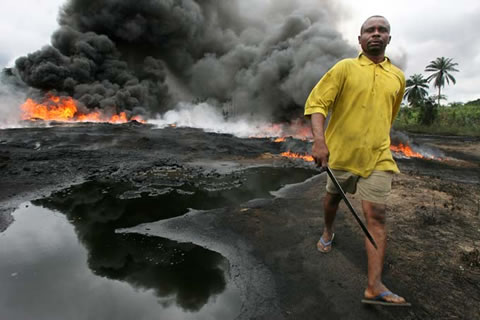
One paradox in the Delta region is that the ethnic groups of the region are often in conflict with one another over resources and government access, yet are also allied against the government and the oil companies in the Delta in various organizations. These include the Chikoko Movement, comprised of Ijaw, Itsekiri, Ogoni, Andoni and Ilage, and the Odua’ People’s Congress, a national self-determination movement advocating greater federalism. Beginning in 1997, these organizations were very active in pressuring the government for a greater share of oil revenues, and for greater political and economic control over their land. They are often militant, seizing oil installations and kidnapping oil workers. Their actions against the state itself are rarely violent, though their members are often involved in violence against rival ethnic groups.
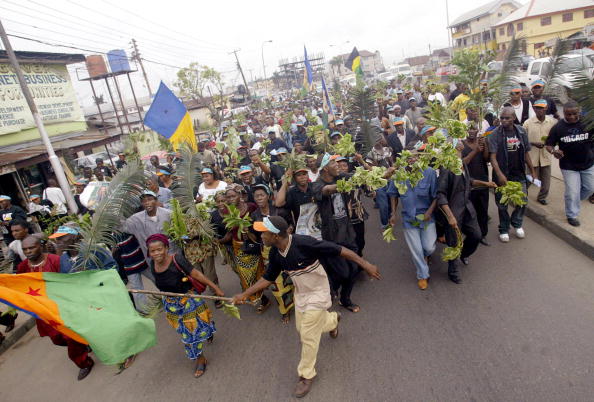
The Ogoni are confronted with both demographic and ecological disadvantages. Compared to the majority of Nigerians the majority of the region are without basic infrastructure, due to continually declining health conditions have a lower life expectancy, and face environmental problems due to the high levels of pollution in the Niger Delta. Due to the repressive actions taken by the Nigerian government in the past and present, many Ogoni have left the region entirely. Many of the restrictions that the Ogoni faced have been removed since the elections of 1999 and international awareness of their plight. In the past, nonetheless, the group is still excluded by the majority of the country in political and economic matters due to historical neglect, and no policies were in effect to remedy the situation (POLDIS01-03 = 2). However, in recent years there have been negotiations involving representatives of the Ogoni’s, Shell Oil and the Nigerian government to take redressive action to compensate the Ogoni for years of environmental degradation. (POLDIS04-06 = 1)
The different ethnic groups in the Niger Delta region have faced severe repression by the government both before and after the transition to democracy in 1999. In 1999 there were reprisal killings by military and police units in the Niger Delta, torture and rape was used against the the different ethnic groups in the region. The Nigerian military effectively sealed off the area to outsiders after the Ogoni became vocal in their demands, and Ogoniland became a militarized region. In 2000 an Ogoni leader’s house was destroyed and he was arrested. As of the end of 1999, at least 2,000 Ogoni had been killed since their peaceful protests against Shell Oil began. In the period 2001-2003, the level of repression against the group seemed to have decreased, although some arrests and high degree of military and police presence continued.
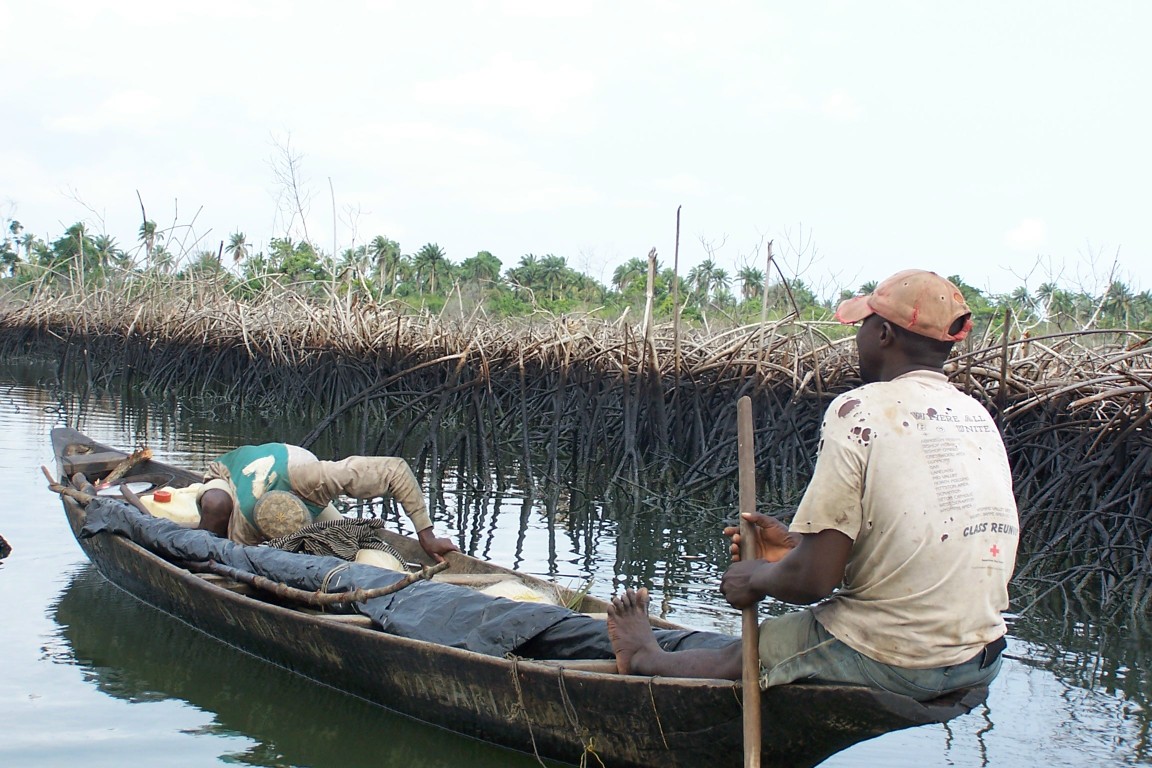
The group has managed to avoid conflict with other ethnic groups in the region recently, since it appears that most of the groups in the region have common enemies in the large oil companies in the Delta, and the government. This has not always been the case for during the early 1990s there was communal conflict between the Ogoni and Andoni, another small ethnic group in the south.
The main group representing the Ogoni is the Movement for the Survival of the Ogoni People (MOSOP), which was led by Ken Saro-Wiwa before his execution. The MOSOP strategies for change involved nonviolent means. The group has consistently accused Shell of causing major environmental damage to the area. Shell denies the problem is as big as the Ogoni claim, but independent environmental assessments of the area before it was closed to outsiders in 1993 support the Ogoni claim of extensive environmental damage. Some of the damage includes leaking pipelines, polluted water, oil in villagers’ fields, air pollution, flooding resulting from the building of canals for the oil industry and disruptions of fresh water supplies.
The Nigerian government has long refused to negotiate with MOSOP, claiming it was not a legitimate organization. Further, the oil companies of the region appeared at times to be in complicity with the government, possibly even involved in some of the violence against the Ogoni people. The group seems to not receive much considerable material support from other kindred groups or transnational organizations. There is much rhetorical support from exiled Ogoni’s in other areas of the world, such as Canada, U.K. and the U.S. Additionally, there are many non-governmental organizations which work to promote the condition of the group and provide information on their campaign against Shell.
 |
| Ogoni woman fetches water from afar to cross river. This river is polluted and she cant consume it. |
THE ADVERSE EFFECT OF NATIONAL DEVELOPOMENT TO THE OGONI PEOPLE AND THEIR ENVIROMENT
Ogoni-land is in total economic
isolation by the government and most roads have been left to wear,
making transportation extremely difficult.
The environmental costs of the oil exploration have been and still are,
very high. The agricultural and fishing communities experienced huge
oil spills and pollution of drinking water, fishing grounds and
farmlands. Large flares burnt gas from the oil extraction process,
illuminating the sky day and night and polluting the air. The 1970’s
brought increasing activity from the oil companies, claiming more space
in an already crowded territory, and resulting in a deteriorating
environment and in decreasing crop yields and fish catches.
The Movement for the Survival of the
Ogoni People has struggled against the degradation of their lands
by Shell in Nigeria. MOSOP was an offshoot of another Ogoni organization
and only metamorphosed into MOSOP based upon a study of
the republican struggle in Northern Ireland. Reference is made to this
in a speech by Goodluck Diigbo, Ken Saro-Wiwa’s confidant. Goodluck
Diigbo, a journalist, was the National President of the National Youth
Council of Ogoni People, NYCOP. Saro-Wiwa had charged him with the
responsibility of establishing seven of the ten affiliates that made up
MOSOP. Before the affiliates came into being, Ken Saro-Wiwa who
initiated the idea of MOSOP had attracted a mix of educated Ogoni elites
and chiefs, including its first presidentDr. Garrick Barile Leton,
Chief E. N. Kobani became vice president of MOSOP.
MOSOP initiated its efforts with the
1990 Ogoni Bill of Rights, addressed to the federal government. The
Bill reads like a model statement before a mediator. It lists their
concerns: oil-related suffering of their people, governmental neglect,
lack of social services, and political marginalization. These concerns
were placed in the context of a self-definition: the Ogonis as “a
separate and distinct ethnic nationality.” On this basis they
sought autonomy, environmental protection, control of a fair share of
the revenues from their resources, and cultural rights, such as the use
of their local languages.
 |
 |
 |
 |
Beginning December 1992, the
conflict escalated to a level of greater seriousness and intensity on
both sides. It was in this phase of the conflict that overt violence was
applied on the large scale by the Nigerian government. Diigbo, who had
survived seven attempts on his life as he administered day to day
affairs of MOSOP said in February 2002 at the Indigenous Peoples Global
Conference, IPGC held at the United Nations, New York that: “Ogoni was
boxed in, stuck with nonviolence and had no resources to weather the
violent storm instigated by Shell and the government. We risked instant
extermination, if we, the Ogoni people had dared to resort to violence.
We were barricaded by excessive violence. Violence tempted us to respond
and watched over us to dare. Let me admit that we were incapable of
violent self-defense, so we dared, but without recourse to violence.”
The collision course between the two parties was set with an ultimatum
to the oil companies (Shell, Chevron, and the Nigerian National
Petroleum Company) which demanded some $10 billion in
accumulated royalties, damages and compensation, and “immediate stoppage
of environmental degradation,” and negotiations for mutual agreement on
all future drilling. If the companies failed to comply, the Ogonis
threatened to embark on mass action to disrupt their operations. By this
act, the Ogonis shifted the focus of their actions from an unresponsive
federal government to oil companies actively engaged in their own
region. The bases for this assignment of responsibility were the vast
profits accrued by the oil companies from extracting the natural wealth
of the Ogoni homeland, none of which were trickling down to the Ogoni.
The national government responded by
banning public gatherings and declaring that disturbances of oil
production were acts of treason. In spite of the ban, MOSOP went ahead
with a massive public mobilization on January 4, 1993. The event, called
the first Ogoni Day, attracted about 300,000 people in massive
festivities, the largest mobilization of the Ogoni ever conducted. Over
the next month as the mobilization continued, one Shell employee (out of
thousands) was beaten by an Ogoni mob. As a security measure, Shell
Petroleum Development Company withdrew its employees from Ogoniland.
This action had very mixed consequences. Oil extraction from the
territory has slowed to a trickle of 10,000 barrels per day (1,600 m3/d)
(.5% of the national total). However, because the withdrawal was a
temporary security measure, it provided the government with a compelling
reason to “restore order”: resume the flows of oil from Ogoniland and
of oil money to national coffers.
On May 21, 1994, four Ogoni chiefs
(all on the conservative side of a schism within MOSOP over strategy)
were murdered. Saro-Wiwa, head of the opposing faction, had been denied
entry to Ogoniland on the day of the murders, but was then detained in
connection with the killings. Rivers State Military Administrator Lt.
Col. Dauda Komo did not wait for a judicial investigation to blame the
killings on “irresponsible and reckless thuggery of the MOSOP element
The occupying forces, led by
Major Paul Okuntimo of Rivers State Internal Security, claimed to be
“searching for those directly responsible for the killings of the four
Ogonis.” However, witnesses say that they engaged in terror operations
against the general Ogoni population. Amnesty
International characterized the policy as deliberate terrorism. By
mid-June, 30 villages had been completely destroyed, 600 people had been
detained, and at least 40 had been killed. An eventual total of around
100,000 internal refugees and an estimated 2,000 civilian deaths were
recorded.
On 10 November 1995 nine activists
from the movement, among them the playwright Ken Saro-Wiwa, were hanged
by the Nigerian government on charges of “incitement to murder”. The
Commonwealth, which had pled for clemency, suspended Nigeria’s
membership in response.
The Human Rights Watch published report: The Ogoni Crisis: A Case-Study of Military Repression in Southeastern Nigeria, 1 July 1995, contains further details of the repression against Ogoni People and MOSOP in the early nineties.
Ogoni Day observances and protests
were held under military occupation on January 4, 1996. Five or six
protesters were killed in the town of Bori.
ECONOMY
The Ogoni are an agricultural and fishing society. Yam and cassava
farming are important ways of making a living, although the revenues of
these products are not very high. The most important export product of
Nigeria is oil, but the Ogoni people have never profited from these
exports.
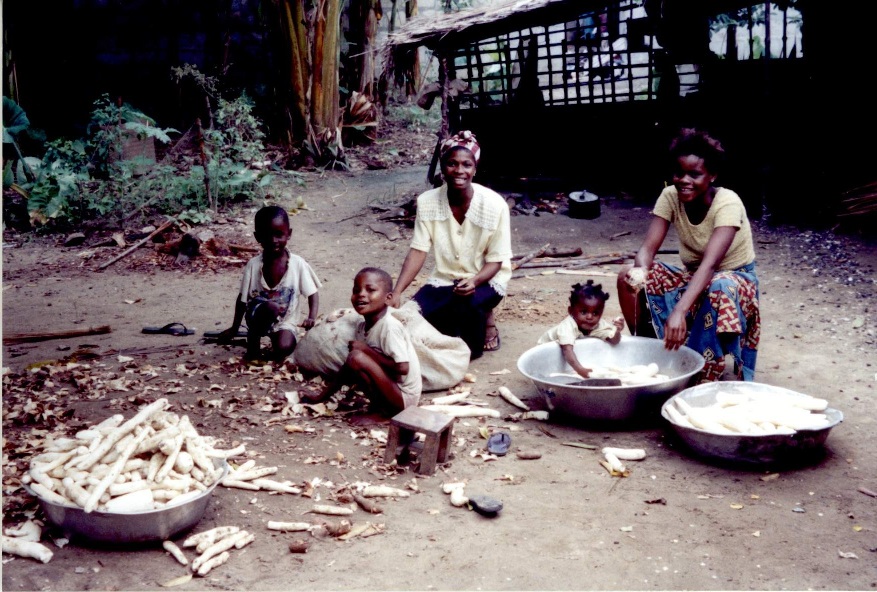
two women and their children cleaning cassava, one of the main staple crops in Bodo,Gokana,Niger delta
Once the ‘food basket’ for the Niger Delta and beyond, Ogoniland’s
agricultural production has now been severely reduced. This is partly
due to loss of farmlands through oil polution and partly to soil
fertility problems arising from acid/alkaline rain caused by gas
flaring. Large areas of fresh and salt water resources as fishing
grounds have also been rendered useless by oil spills. Food is becoming
increasingly expensive and potential farmers are too poor to pay for
seeds and labour.
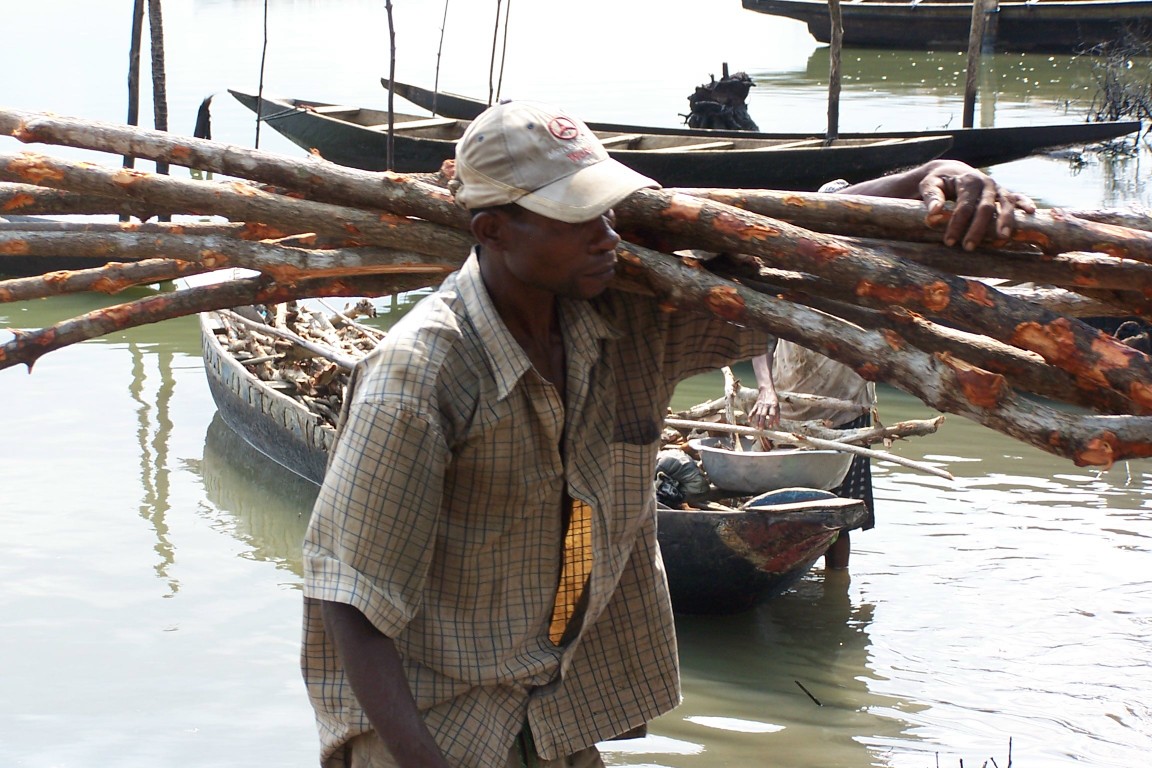
Ogoni fisherman with wood
Poverty has worsened in the Ogoni areas during the last years. Nearly
all oil workers are people coming from outside the area whom the local
people have had to compete with for basic commodities. Besides the oil
installations and refineries there are no manufacturing industries in
Ogoni to reduce unemployment. This situation increasingly results in
psycho-social degradation.
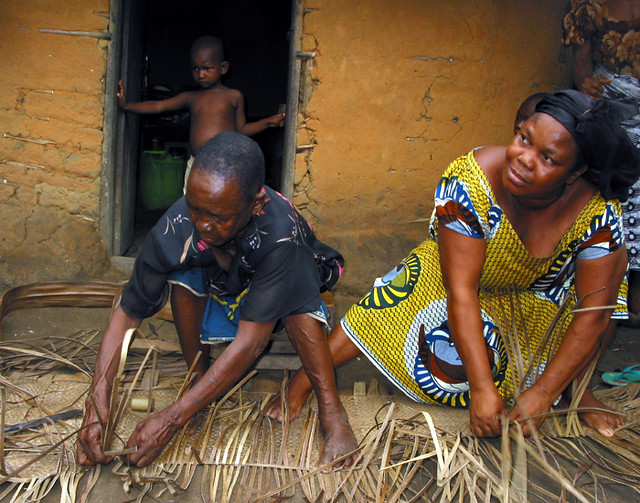
Mat makers,Ogoniland,Nigeria
There are no government projects to address the problems of development
in Ogoni-land. Health facilities are almost non-existent and school
buildings are collapsing with the classrooms and laboratories empty.
Attracting foreign aid to Ogoni-land has been difficult and a couple of
community self-help initiatives by the people were branded
‘MOSOP-inspired’ and stopped.
Ogoni-land is in total economic isolation by the government and most
roads have been left to wear, making transportation extremely difficult.
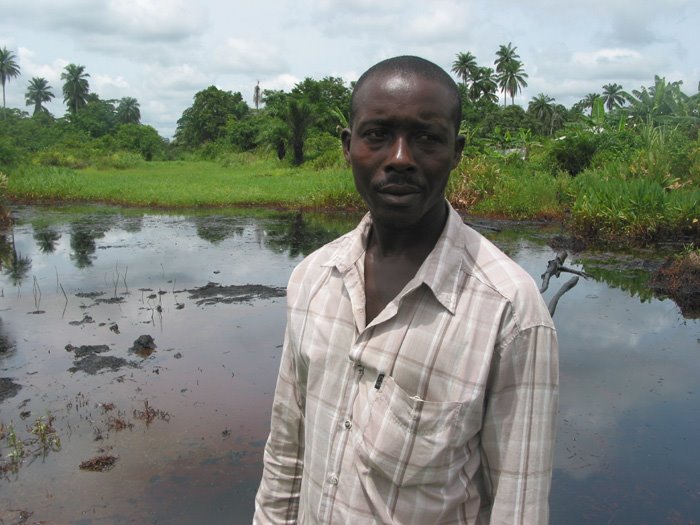
The environmental costs of the oil exploration have been and still are,
very high. The agricultural and fishing communities experienced huge oil
spills and pollution of drinking water, fishing grounds and farmlands.
Large flares burnt gas from the oil extraction process, illuminating the
sky day and night and polluting the air. The 1970’s brought increasing
activity from the oil companies, claiming more space in an already
crowded territory, and resulting in a deteriorating environment and in
decreasing crop yields and fish catches.
OGONI FESTIVALS
Socially, the Ogoni is endowed with a large variety of cultural
practices. These include masks and masquerades, human figure
representation of the ancestors, as maybe used in Ka-elu performances
and the puppet shows which are performed exclusively by the Amanikpo
Society. Majority of these cultural performances in this relatively
small region are extraordinarily varied. Most if not all, Ogoni villages
have their own festivals, some of long standing, others introduced
within living memory. The festivals are mainly held to commemorate the
founding of the villages, to pay allegiance to particular ancestral land
or water spirits, to mark the planting and harvesting seasons, for the
fertility deity, to recognize the taking of titles, to restore peace in
troubled community, to maintain cohesion within social groupings and for
general entertainment.
The Karikpo Mask/Masquerade
Of all their known festivals and masquerades, the mask style for which
the Ogoni are probably most renowned is the one called Karikpo. The
Marikpo mask represents animals and is worn on the front of the face by
men and boys. It is used for vigorous acrobatic play, performed
originally during planting and harvesting seasons for fertility, new yam
festivals, and burial ceremonies of members and recently for Christmas
and New year celebrations, including reception for a distinguished guest
or an illustrious son. The masquerade
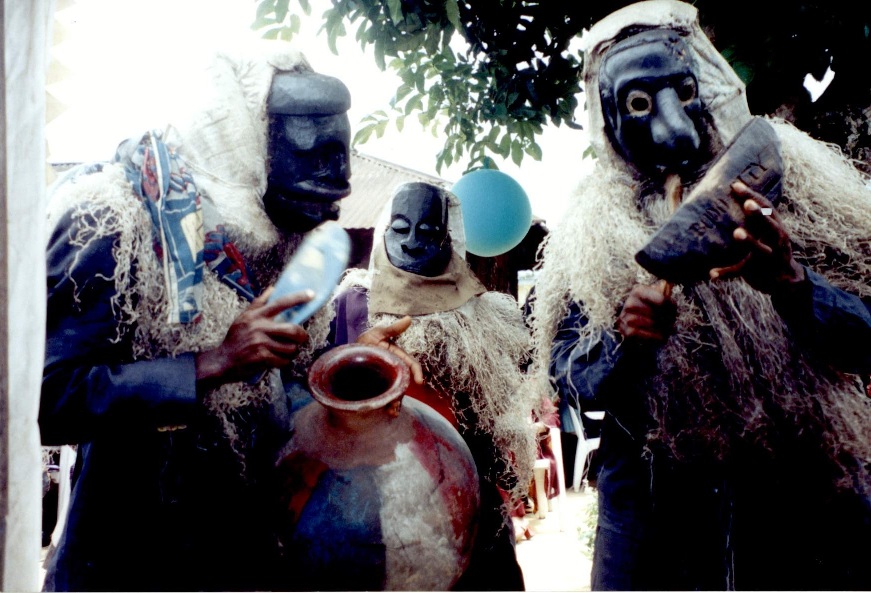
The
Ogoni are renown for their carved masks and traditional dancers are an
important part of many ceremonies in Bodo. Shown here are members of the
Kanutete cultural dance group in 2002.
Performance is believed, especially in Khana to have originated in a
certain community known as Bien-Gwara. Although there may not be
substantial proof to this, but it is believed the community’s
interaction with the Ibibios of Akwa Ibom State, where Ekpo mask has its
provenance, may have influenced its adaptation and modification hence
its name Kari (Carved) Kpo (Ekpo). Membership into the Karikpo Society
does not require an elaborate ritual or initiation, but an intending
member is made to provide items like a bottle of gin, palm wine, a plate
of oiled fish. These would be eaten by the members who then accepts him
as one
of them.
SOURCES: kwekudee-tripdownmemorylane.blogspot.com.ng,wikipedia.org,logbaby.com
